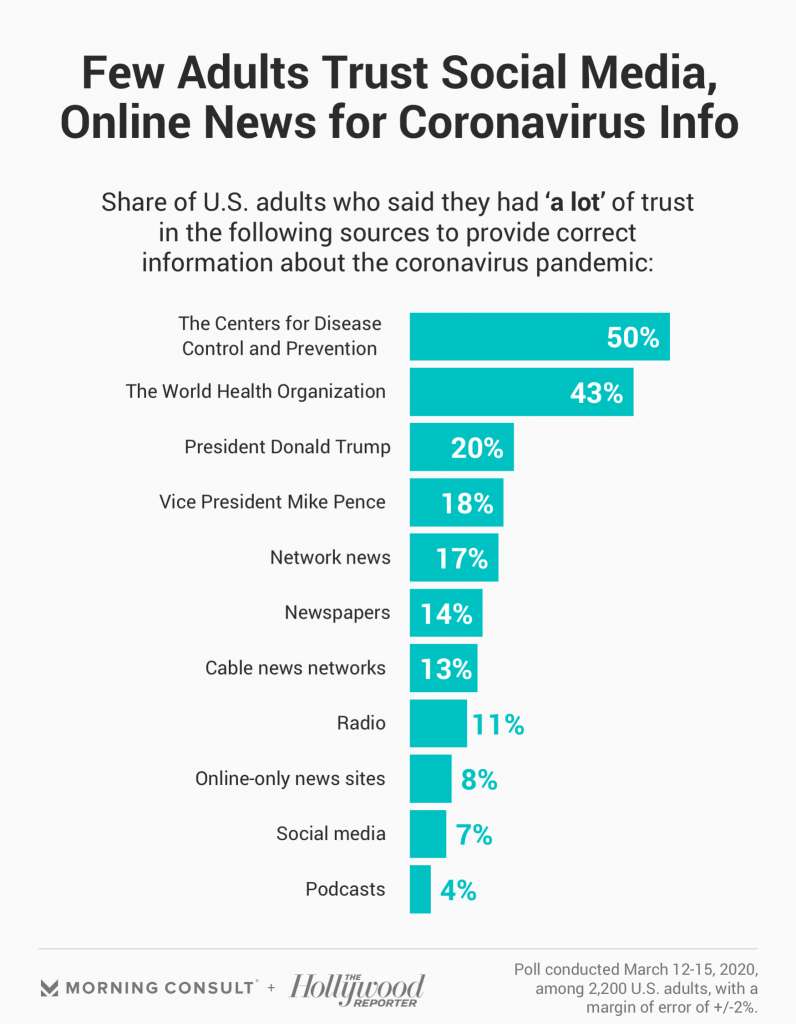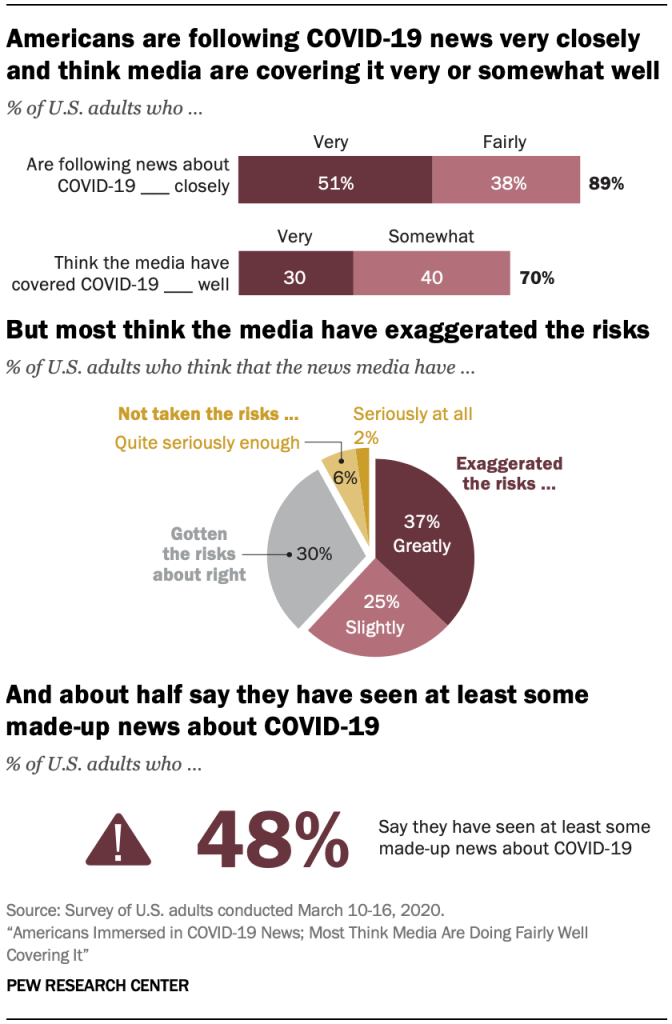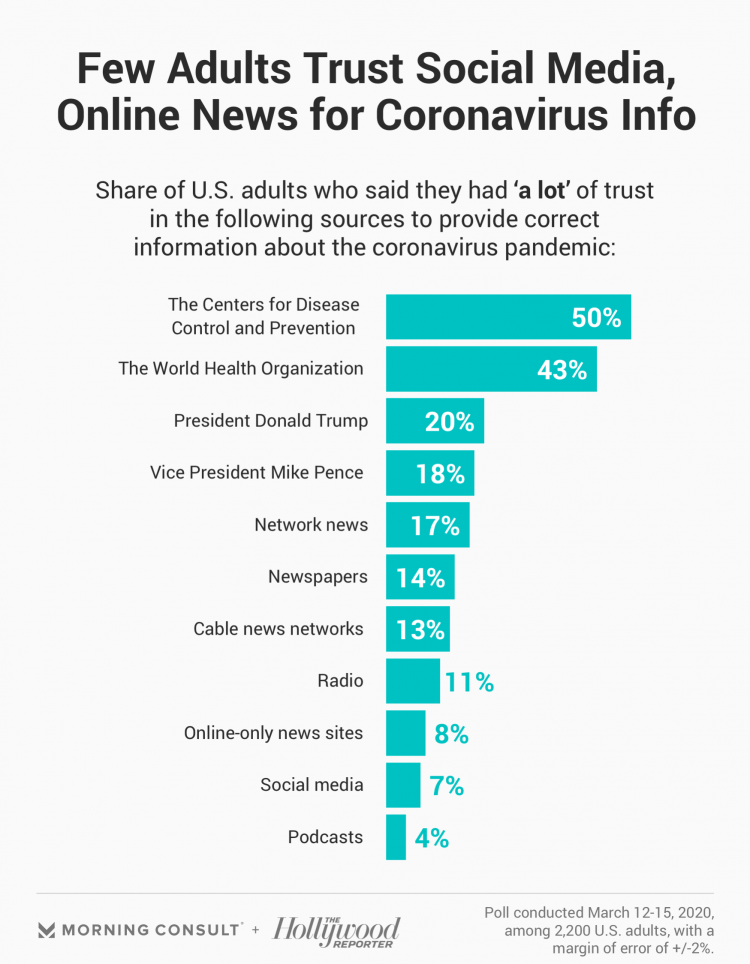 One in two Americans trust the Centers for Disease Control for the facts on the coronavirus pandemic, and 43% trust the World Health Organization.
One in two Americans trust the Centers for Disease Control for the facts on the coronavirus pandemic, and 43% trust the World Health Organization.
But there’s a huge trust deficit when it comes to trusting President Donald Trump on the facts about COVID-19, a poll from Morning Consult and The Hollywood Reporter found.
2,200 U.S. adults were surveyed between 12 and 15 March 2020 on the coronavirus pandemic and their perspectives on the media and political leaders’ information credibility.
For news on the pandemic, only one in five Americans believed the President and 18%, the Vice President, Mike Pence, followed closely by network news, and then newspapers and cable news. Radio trust plummets to 11% of the public.
A tiny handful of people trusted social media and podcasts for factual information on the coronavirus pandemic, 7% and 4% respectively.
“The poll also indicates that a portion of the public has a high threshold for accurate information and isn’t afraid to tune out if that expectation isn’t met,” the Morning Consult analysis explained. Based on the consumer’s party ID, 45% of Democrats stopped watching a program they felt was reporting incorrect information, and 58% of Republicans switched the program off.
Morning Consult added that, “Fox Business host Trish Regan saw her program placed on indefinite hiatus Friday after she described the coronavirus as, ‘another attempt to impeach the president’ during her show last week. The network said the move came as a result of ‘the demands of the evolving pandemic crisis coverage,'” The New York Times observed.
 Health Populi’s Hot Points: A timely study from the Pew Research Group published yesterday looks at Americans’ media views on the coronavirus through various demographic cuts, including age and party ID. While most people in the U.S. generally believe media are doing fairly well covering the pandemic, 1 in 2 believe they’ve seen made-up news about COVID-19.
Health Populi’s Hot Points: A timely study from the Pew Research Group published yesterday looks at Americans’ media views on the coronavirus through various demographic cuts, including age and party ID. While most people in the U.S. generally believe media are doing fairly well covering the pandemic, 1 in 2 believe they’ve seen made-up news about COVID-19.
29% of Americans think the virus was created in a lab.
Pew interviewed 8,914 U.S. adults between 10-16th March 2020.
Key insights from the Pew study were that:
- 4 in 10 Americans correctly answer that the origin of the Coronavirus came about naturally (science fact: the virus naturally occurred in bats)
- 1 in 4 Americans said the virus was developed in a lab, a theory pushed by Senator Tom Cotton of Arkansas and certain news channels
- One-half of people expect a vaccine for COVID-19 would be on the market in at least a year, consistent with current/recent public health experts’ testimony
- 1 in 5 say a vaccine could be available in a few months, which has been forecasted by President Trump in mid-day White House briefings
- 4 in 5 Democrats say the news media are doing a good job (very or somewhat) discussing the pandemic
- 59% of people who lean Republican believe the media are doing a good job
- Most Republicans, 76%, believe media have exaggerated the risks of COVID-19 (53% “greatly” and 24% “slightly”)
- Most partisans believe “their” favorite news sources are doing a good job covering the pandemic.
Republicans are more likely than Democrats to say they’ve seen made-up news related to the virus, but larger differences emerge in responses to two questions about COVID-19. On the origin of the virus, about half of Democrats (52%) correctly indicate that it most likely came about naturally, compared with 37% of Republicans. Republicans, on the other hand, are about twice as likely as Democrats to say it was developed intentionally in a lab (30% vs. 16%). About a quarter of both groups say they aren’t sure. And when asked about the possibility for a vaccine, the largest portion of both political groups echo the views of public health experts by answering that it would not be available for at least a year (44% of Republicans and Republican leaners and 54% of Democrats and Democratic leaners). But Republicans are more likely than Democrats to say a vaccine will be ready in the next few months: 28% compared with 17%.

So much science, medical and other evidence-based media is published behind “paywalls,” that is, portals online that require payment either as subscriptions or on an a la carte basis (sometimes running over $30 per article downloaded). The good short-term news is that, according to Saanya Jain who writes about strategy for Atlantic Media, some paywalls are coming down to allow consumers seeking sound information on the coronavirus access to up-to-the-minute news and research. This chart organizes Saanya’s information as of 16th March 2020. This will be an organic changing phenomenon, and very welcome to those of us who believe in the currency and value of science facts.
To that point: at today’s White House press conference, President Trump spoke for several minutes about the use of chloroquine, an anti-malarial drug, to treat patients diagnosed with the coronavirus. Existing research analyzed through a meta-analysis published 10th March 2020 found very little evidence choroquine would be efficacious for treating COVID-19.
“Trump said that chloroquine was approved for use and that he wanted to ‘remove every barrier’ to test more drugs against COVID-19 and ‘allow many more Americans to access drugs that have shown really good promise,'” Bloomberg news reported. Here is what STAT’s health reporters had to say about the President’s bullish attitude about a drug not-yet-approved by the FDA for use in fighting the coronavirus (hint: it’s about drug safety first).
Good that 50% of consumers trust the CDC and 43%, the World Health Organization, for factual information on COVID-19 and the coronavirus.
As for the 20% that trust President Trump “a lot” as an information source for the pandemic? Well, 80% don’t trust him “a lot.” Here’s to bolstering health and science literacy in America once we endure and survive the COVID-19 pandemic. Education is a key social determinant of health; never forget.





 Interviewed live on BNN Bloomberg (Canada) on the market for GLP-1 drugs for weight loss and their impact on both the health care system and consumer goods and services -- notably, food, nutrition, retail health, gyms, and other sectors.
Interviewed live on BNN Bloomberg (Canada) on the market for GLP-1 drugs for weight loss and their impact on both the health care system and consumer goods and services -- notably, food, nutrition, retail health, gyms, and other sectors. Thank you, Feedspot, for
Thank you, Feedspot, for  As you may know, I have been splitting work- and living-time between the U.S. and the E.U., most recently living in and working from Brussels. In the month of September 2024, I'll be splitting time between London and other parts of the U.K., and Italy where I'll be working with clients on consumer health, self-care and home care focused on food-as-medicine, digital health, business and scenario planning for the future...
As you may know, I have been splitting work- and living-time between the U.S. and the E.U., most recently living in and working from Brussels. In the month of September 2024, I'll be splitting time between London and other parts of the U.K., and Italy where I'll be working with clients on consumer health, self-care and home care focused on food-as-medicine, digital health, business and scenario planning for the future...